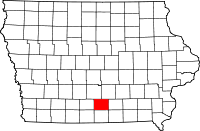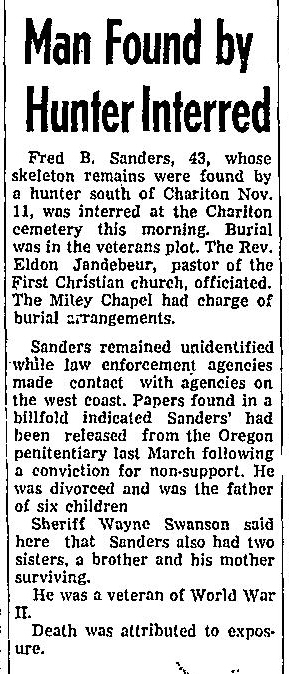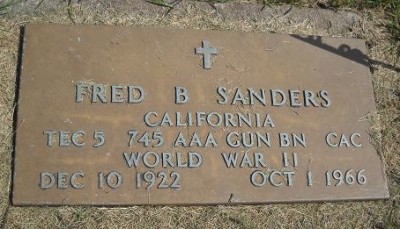 Lucas County in Iowa
Lucas County in Iowa
 Chariton in Lucas County
Chariton in Lucas County
Fred Barton Sanders
DCI Cold Case
Fred Barton Sanders
43 YOA
WW II Army Veteran
TEC 5 — 745 AAA GUN BN — CAC
Chariton, IA
Lucas County
DCI Case # 66-01164
Date of Death: October 1, 1966
Body Found: November 11, 1966
On November 11, 1966, hunter Richard Thorne found a man’s skeletal remains in a brushy area under the Rock Island Railroad viaduct across the Chariton River one and three quarters of a mile south of Chariton, Iowa, in Lucas County.
Papers and a wallet adjacent to the remains identified him as Fred Sanders, a U.S. Army veteran who served during World War II with the 745th American Anti-Aircraft Artillery Gun Battalion.

Courtesy The Chariton Herald-Patriot, Dec. 1, 1966
A Chariton Herald-Patriot article dated Dec. 1, 1966, said papers found in a billfold indicated Sanders had been released from the Oregon penitentiary in March following a conviction for non-support.
Sanders, the article stated, was divorced and the father of six children.
On Sanders’ cemetery gravestone, family members list his date of death as October 1, 1966.
Investigators initially speculated Sanders had taken a fall while riding the rails. His only detectable injury, however, was a fractured wrist.
Though the Herald-Patriot article attributes cause of death as exposure, when the Iowa Division of Criminal Investigation (DCI) established a Cold Case Unit in 2009, Fred Sanders’ death was one of approximately 150 cases listed on the Cold Case Unit’s new website as those the DCI hoped to solve using latest advancements in DNA technology.
Although federal grant funding for the DCI Cold Case Unit was exhausted in December 2011, the DCI continues to assign agents to investigate cold cases as new leads develop or as technological advances allow for additional forensic testing of original evidence.
The DCI remains committed to resolving Iowa’s cold cases and will continue to work diligently with local law enforcement partners to bring the perpetrators of these crimes to justice for the victims and their families.
On Saturday, Sept. 28, 2019, Vietnam veteran Frank D. Myers of Chariton, Iowa, posted a remarkable tribute to Fred Sanders on his “Lucas Countyan” blog.
Myers described the post as “the fifth in a series of six scripts used during last Sunday’s 16th annual Chariton Cemetery Heritage Tour.” He identified the subject as Fred B. Sanders and Jamie Wilson as the portrayer.
The post is written in first-person narrative from Fred Sanders’ potential point of view, and begins:
You-all have heard I guess about what the Good Book says, “I was a stranger and you took me in….” Well that’s kind of how I ended up here back in 1966 — and in getting here, it may be that I caused more trouble than I was worth. My name is Fred Barton Sanders and I was lost and alone when I died among you — just a little southeast of here — in my 44th year.
Myers goes on to describe Sanders’ life and how Sanders went with his parents to Los Angeles, Calif., just prior to Pearl Harbor. The 20-year-old Sanders was taking tickets and cleaning up at the Pantages Theatre on Hollywood Boulevard when he enlisted in the Army in 1942.
The blog post is a worthy read and includes some well-researched information including:
- How he married Norma Schoonover just before deploying
- His assignment to the 745th Anti-Aircraft Artillery Gun Battalion and deployment to New Guinea and then the Philippines
- How he and Norma had six kids in quick succession during the next 10 year or so (Eric, Rick, Gloria, Becky, Teresa and Janine)
- The family’s move from California to Eugene, Oregon
- How his life fell apart for reasons he couldn’t explain
- How he started drinking, lost his job, started bouncing checks and getting into other minor scrapes
- Norma divorcing him
- How, by 1963, he was way behind on child support for the minor children and, charged with failure to pay, indicted by a grand jury, found guilty and sentenced to the state penitentiary as a result
- His release from the pen on March 19, 1966 — with nothing changed
- Being flat broke, using his thumb and passing freight trains to head to the Pacific Northwest, then the Midwest, and then climbing aboard a Kansas City-bound freight at the Rock Island Depot with hopes of spending the winter in a warmer climate
- His alleged fall from the train as it crossed the Chariton River south of town, which resulted in a broken wrist
It is unknown exactly how Sanders fell — or perhaps pushed — from the train just as it crossed a large viaduct with a 50-foot drop, how he suffered only a broken wrist or why the Iowa DCI lists his death as a cold case.
According to a Weather Underground report for Oct. 1, 1966, Chariton’s temperature hit a low of 35º at 7 a.m. and reached a high of 60º at 4 p.m. Overnight temperatures ranged from 45 to 48º, and Oct. 2, 1966, recorded the day’s high of 74ºF at 4 p.m.
Many thanks to Mr. Frank D. Myers and the Chariton Cemetery Heritage Tour for exploring possible insights into one veteran’s life.
Read the full blog post by Frank Myers here.
About Fred Sanders
 Courtesy photo Doris Christensen, findagrave.com
Courtesy photo Doris Christensen, findagrave.comFred Sanders is buried at the Chariton Cemetery in Lucas County.
Fred Sanders was born in Lawrence, Kansas, on December 10, 1922, to Clara Jane Hothan and Clyde Barton Sanders.
He married Norma Cathryn Schoonover in 1942, and the couple had six children.
He served in the United States Army during World War II as a Technician Fifth Grade with the 745th American Anti-Aircraft Artillery Gun Battalion’s Continental Air Command.
The Rev. Eldon Jandebeur, pastor of the First Christian Church, officiated memorial services on Dec. 1, 1966, with the Miley Chapel in charge of burial arrangements.
Fred Sanders was laid to rest in the Chariton Cemetery in Lucas County, Iowa.
In addition to his children, Sheriff Wayne Swanson said Sanders also had two sisters, a brother and his mother surviving.
Information Needed
If you have any information about Fred Sanders’ unsolved murder please contact the Iowa Division of Criminal Investigation at (515) 725-6010 or email dciinfo@dps.state.ia.us.
Sources:
- “Cemetery Tour 5: Fred Sanders, stranger among us,” by Frank D. Myers, LUCAS Countyan, Saturday, Sept. 28, 2019
- Iowa Division of Criminal Investigation, Cold Case Unit, Dec. 25, 2009
- Lucas County Sheriff’s Office
- Frank Myers
- “United States Social Security Death Index,” database, FamilySearch, Fred Sanders, Oct 1966; citing U.S. Social Security Administration, Death Master File, database (Alexandria, Virginia: National Technical Information Service, ongoing).
- Fred Barton Sanders (1922 – 1966) — Find a Grave Memorial
- “Man Found by Hunter Interred,” The Chariton Herald-Patriot, Dec. 1, 1966
Copyright © 2024 Iowa Cold Cases, Inc. All rights reserved. This material may not be published, broadcast, rewritten or redistributed.


 Chariton in Lucas County
Chariton in Lucas County
 Courtesy photo Doris Christensen, findagrave.com
Courtesy photo Doris Christensen, findagrave.com
The other thought I had was that he might have suffered from what we now know as PTSD, from his service in WW II. Her divorcing him, most likely did not help him. He most likely never sought treatment and maybe qualified for a disability for his condition. The money could have helped him support his family. But, then he was thrown under the bus.
KP, he did have a responsibilty to support his family. However, he puts his life on the line for his country. He may have suffered some from serving in combat, that affected him. I wonder if he ever returned to Kansas, he might have gotten support from his siblings.
How many WW II veterans suffered from their time in combat. Many of them never spoke about what they saw. How many of them never sought the treatment and the option of getting a disability from the military.
So, this may have caused problems in his marriage, led to the divorce and being put in prison for non-support. So, he gets out an rides the rails and ends up dead in Iowa.
So, his ex-wife and family are out of luck in getting any financial support from him.
P.S. I am a veteran and the son of a WW II veteran, who suffered from what we know call PTSD. I also worked as a police officer and detective at a VA hospital in Chicago. So I have seen my share of what combat does to these guys.
One patient broke down crying about the fact that he was sent into combat in North Africa, with not a lot of training.
My father suffered during 18 months of combat, was wounded and knocked out three times from concussions. He got lucky when a doctor temoved him from combat.
His death is considered a homicide. Yet, it does not indcate how his death tied to exposure is considered a homicide. Also, he us from Kansas, yet spends time in a Oregon prison for non-support. He serves his country and they throw h7m in jail. He should have gone back to Kansas and his famiy. He might have found work and supported his family.
Since, he was deceased his ex-wife and kids got nothing for getting sent to prison. He gets out and is riding the rails and ends uo dead. I hope she was happy with the outcome.
You fail to understand, or at least to acknowledge, that he had a responsibility to support the children he fathered. It has nothing to do with whether or not she was “happy with the outcome”.
Its just disturbing at how many there are and what about the ones that were missed or we dont know about. Creepy.
All of these bother me. To think of a family member gone, especially murdered with no answers, I just can’t imagine. Add he was a veteran and its even more devastating. He served a country in which he returned to and was murdered in. Just so messed up. Prayers they find who did this. This was 48 years ago, even if the murderer were deceased, to have closure for the victims remaining generations would be respectful and right.